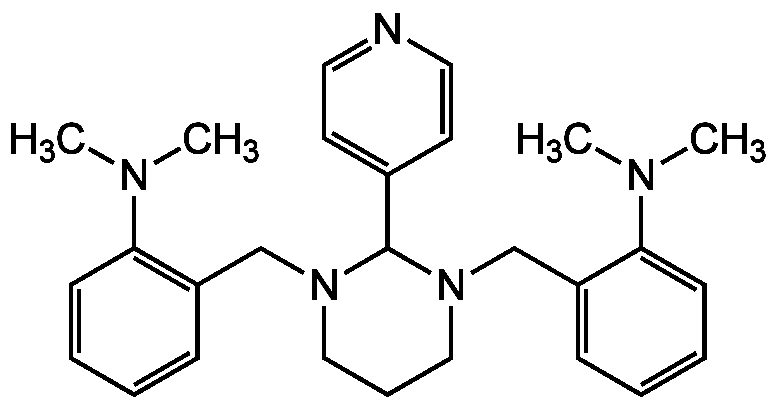
Chemical Structure
GANT61 [500579-04-4]

AG-CR1-3561
Overview
- SupplierAdipoGen Life Sciences
- Product NameGANT61 [500579-04-4]
- Delivery Days Customer10
- CAS Number500579-04-4
- CertificationResearch Use Only
- Estimated Purity>98%
- Molecular FormulaC27H35N5
- Molecular Weight429.6
- Scientific DescriptionCell permeable GLI antagonist. Inhibits Gli1 and Gli2-induced transcription [1]. Sonic hedgehog (Shh) signaling pathway inhibitor, downstream of SMO and SUFU [1]. Displays antiproliferative and antitumor activity in vitro and in vivo [1, 2 , 3, 4, 5]. Apoptosis inducer [1, 2 , 3, 4, 5]. - Chemical. CAS: 500579-04-4. Formula: C27H35N5. MW: 429.6. Cell permeable GLI antagonist. Inhibits Gli1 and Gli2-induced transcription. Sonic hedgehog (Shh) signaling pathway inhibitor, downstream of SMO and SUFU. Displays antiproliferative and antitumor activity in vitro and in vivo. Apoptosis inducer.
- SMILESCN(C)C1=CC=CC=C1CN1CCCN(CC2=C(C=CC=C2)N(C)C)C1C1=CC=NC=C1
- Storage Instruction-20°C,2°C to 8°C
- UNSPSC12352200
References
- Inhibition of GLI-mediated transcription and tumor cell growth by small-molecule antagonists: M. Lauth, et al.; PNAS 104, 8455 (2007)
- Inhibition of GLI, but not Smoothened, induces apoptosis in chronic lymphocytic leukemia cells: P. Desch, et al.; Oncogene 29, 4885 (2010)
- Hedgehog signaling drives cellular survival in human colon carcinoma cells: T. Mazumdar, et al.; Cancer Res. 71, 1092 (2011)
- HH/GLI signalling as a new therapeutic target for patients with oral squamous cell carcinoma. M. Yan, et al.; Oral Oncol. 47, 504 (2011)
- Blocking Hedgehog survival signaling at the level of the GLI genes induces DNA damage and extensive cell death in human colon carcinoma cells: T. Mazumdar, et al.; Cancer Res. 71, 5904 (2011)
